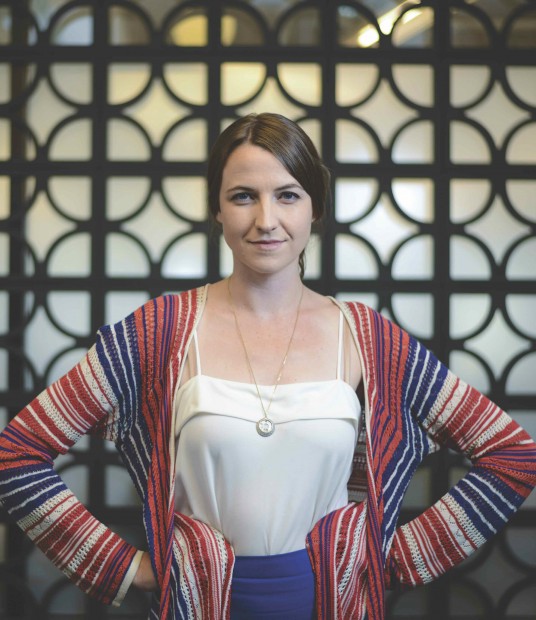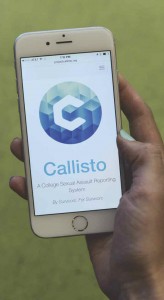
GET HER GOING, and Jessica Ladd ’08 will talk effusively about her many positive Pomona memories, from late-night sponsor-group discussions about free will to sunny study sessions on Walker Beach.
In many ways, Pomona directly inspired her career path. She created her own major in public policy and human sexuality, writing her thesis on condom distribution in California prisons and jails. She turned The Student Life’s often-lewd sex column into a thoughtful exploration of topics such as virginity, safe sex and consent.
Perhaps most pivotally, and certainly most traumatically, Pomona was also the place where she was sexually assaulted.
The incident itself was harrowing, but its aftermath was in some respects even more traumatizing. Ladd found herself unsure of how to go about doing basic things like finding emergency contraception and confidentially getting tested for STDs. Worse still, in reporting the assault she felt like a passive and helpless participant, from the tone of campus security’s questioning to uncertainty about how her answers would be used.
“Instead of feeling empowered, I left the situation on the verge of tears,” she says. “It made me realize that many of the tools for improving the process didn’t exist, and sowed the seeds for wanting to create a better way.”
As founder and CEO of Sexual Health Innovations (SHI), Ladd has developed a tool called Callisto that is aimed at making survivors feel more comfortable reporting their experiences. This fall, two institutions will adopt the technology, including the very place where Ladd’s frustrating but illuminating journey first started.
Sexual assault is consistently one of our country’s most under-reported crimes, with upwards of 80 to 90 percent of incidents going undocumented. The reasons range from logistical, to social, to psychological. Victims may be afraid people will think they are lying or exaggerating; they may worry that accusing their acquaintances will ostracize them from social circles; and they may be scared to publicly re-live the experience in a trial where their credibility and character are continuously questioned.
“Because survivors have had their agency stripped in such a severe way, they often feel hesitant to give information to authorities if they think they might lose that agency all over again,” says Ladd, who herself took over a year to report. “We’re trying to create a trauma-informed system that gives them total control over the process.”

Callisto- a tool to help with reporting sexual assault
Callisto lets users file an incident report that can be sent directly to authorities or archived for later. Users can also choose a third option: saving the report such that it only gets filed if their attacker is separately reported by another user.
It’s a clever feature, and not a trivial one. Ladd often cites a 2002 study which found that 90 percent of campus assaults are committed by repeat perpetrators; she’s confident that Callisto has the potential not only to improve the reporting process, but perhaps even to reduce the number of assaults that happen in the first place.
“If authorities could stop perpetrators after their second assault, 60 percent of assaults could be prevented,” Ladd says. “Callisto isn’t the complete answer, but I think it can be a valuable piece in the puzzle.”
One reason to bet on Callisto is that it was developed with direct input from more than 100 college sexual-assault survivors and advocates, in the form of several months’ worth of surveys, focus groups and interviews.
Among the participants was Zoe Ridolfi-Starr, who last year organized a Title IX federal complaint against Columbia University arguing that the institution treats survivors and alleged assailants unequally. She says that, with Callisto, it was clear from the start that SHI truly understood its audience’s needs.
“Survivors can find it overwhelming enough to try to maneuver through all that red-tape before you even add things like PTSD and depression into the mix,” she says. “SHI has shown that they want to go about the process in a way that’s inclusive, intuitive and intentional.”
Callisto’s sleek interface is designed to make it easy to wade through the murky waters of bureaucracy. Questions have explanatory “help text” to clarify why they are being asked and how answers will be used, while the language is chosen with care and sensitivity. For instance, a question about how much the victim had been drinking is couched in reassurances that such answers do not put her or him at fault and will not, say, get her or him in trouble with the school for violating its alcohol policy.
The system’s development has coincided with sexual assault emerging as perhaps the most-discussed issue in all of higher education, from President Obama’s recent “It’s On Us” initiative to the Columbia University student who carried a mattress all year to protest the school’s handling of her assault allegations.
“As far back as 2013, we realized that if there ever was a time for schools to change their programs, it’s now,” Ladd says. “In the past, adopting this might have seemed like an admission that assault is prevalent on campus. Today, it’s seen as forward-thinking.”
The issue has gained prominence even beyond academia, particularly with the many allegations against comedian Bill Cosby. Ladd says that, while such visibility can be valuable, the growing list of women who have spoken out only further highlights the importance of systems like Callisto for survivors who don’t want to go public, or whose assailants aren’t famous entertainers.
“People shouldn’t have to out themselves to the world to get justice,” she says. “Callisto is a service that we’d eventually like to make available to anyone who needs it.”
Ladd’s interest in sexual health evolved from her upbringing on San Francisco’s Castro Street, where she says that it “always seemed like the city around me was dying of AIDS.” An early clouds-parting moment happened in a high school production of “The Vagina Monologues,” when she first learned that there was such a thing as a clitoris.
“It felt as though the world had been conspiring to not let me know about it,” she says. “It made me wonder, ‘what else are they hiding from me?’”
Since then she has dipped her toes into several different sexual-health-related sectors—as an educator, an academic, a policy advocate and even a White House intern—but says that she became disenchanted with all of these approaches as means to actually effect change.
Instead, she looked at companies like Facebook and Google, and realized that a key way to influence people was through technology.
“The Internet allows people to do things that they would normally find socially awkward, from looking at porn and buying sex toys to propositioning threesomes on Craigslist,” she says. “We’ve harnessed that power to make ourselves happier, but why not use it to make ourselves safer and healthier, too?”
Callisto is the flagship initiative for SHI, which Ladd founded while enrolled full-time in Johns Hopkins’ public-health MPH program. SHI has grown from a makeshift website coded by volunteers to a full-fledged 501(c)(3) nonprofit with bi-coastal offices and more than a quarter-million dollars in funding from Google.
This fall, in efforts that are more than a year in the making, Ladd will launch Callisto at two “Founding Institutions”—Pomona and the University of San Francisco.
“We want to make sure that students feel comfortable reporting sexual assaults when they happen,” says Pomona Associate Dean and Title IX Coordinator Daren Mooko. “Callisto is a very creative mechanism for doing so, in a way that puts a lot of control in the survivor’s hands.”
Ladd says she didn’t come into SHI with particularly entrepreneurial intentions, but simply with a problem that she wanted to solve.
“This is something that I have long believed should exist in the world,” she says. “At a certain point I realized that, while I can’t change what happened to me, what I can do is build something that will hopefully help the next person who’s in that same situation.”
